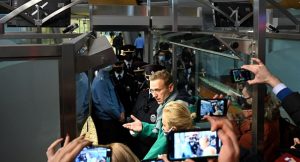Several of his allies were detained following police raids on their apartments and offices hours before the verdict and in the run-up to Sunday’s rally outside the FSB security service’s headquarters.
“This is blatant lawlessness to intimidate me and other people,” Navalny told the court on Thursday via video link from a high-security detention centre in Moscow.
Police detained the 44-year-old anti-graft campaigner at a Moscow airport after he returned to Russia on January 17 from Germany, where he had been recovering from a near-fatal poisoning with a nerve toxin.
A makeshift court at a police station last week ordered Navalny placed in custody until February 15.
His lawyer Olga Mikhailova told reporters after Thursday’s hearing that she intends to appeal the decision, but that “hopes are not high” for success.
Police on Wednesday carried out searches at Navalny’s flat in Moscow and the homes of his allies over alleged violations of coronavirus restrictions during anti-Kremlin protests last week.
– Detentions, criminal probes –
Ivan Zhdanov, the head of Navalny’s FBK Anti-Corruption Foundation, said prominent aide Lyubov Sobol and Navalny’s brother Oleg were detained for 48 hours as suspects in a probe launched by the interior ministry.
Searches were also carried out at the flat of Navalny’s wife Yulia, and in the office of FBK, which is known for its investigations into the wealth of Russia.
Police also arrived at the home of Navalny’s doctor Anastasia Vasilyeva, who was detained for 48 hours too.
In a video posted on Twitter by Vasilyeva’s press secretary, the doctor was playing Beethoven on a piano as people in uniform arrived at the door.
Tens of thousands of people across Russia rallied last weekend in support of Navalny, who is facing charges of violating the terms of a 2014 suspended sentence and could be jailed for two and a half years.

Officials have threatened to fine social media including Instagram, Twitter and TikTok for failing to delete posts urging young people to join the rallies.
Protests in Russia are banned if they are not approved by the authorities, as are calls for people under 18 to join in.
Kremlin spokesman Dmitry Peskov told reporters on Thursday that the state did not want social networks to become “platforms to announce illegal protests”.
The Investigative Committee, which probes major crimes, said it had launched a probe against Leonid Volkov, the head of Navalny’s regional network, for persuading young people to protest.
– ‘Pay the price’ –
The opposition plans to hold more rallies on Sunday, which in Moscow will take place outside the headquarters of the FSB, the security agency that Navalny says targeted him in the poisoning attack on President Vladimir Putin’s orders.
Nearly 4,000 people were detained last Saturday at the unsanctioned rallies, which have sparked a series of criminal investigations.
Rights group Amnesty International on Thursday said Russian authorities “appear shamelessly bent on violating human rights by silencing their critics” and called their actions a “cowardly attempt” to prevent further protests in Navalny’s support.
The Moscow prosecutor’s office said it had sent out warnings ahead of Sunday’s rally to six individuals and five internet platforms, without naming them.
Despite pressure from authorities and threats of arrest, the opposition appears unwilling to back down.
Volkov said on Telegram that Sunday’s rallies will take place “despite searches and late-night interrogations, despite the 4,000 arrests last week, despite the lies and intimidation of Kremlin propaganda”.
Political analyst Alexander Baunov of the Carnegie Moscow Center told AFP that Navalny’s continued protest of the government was evidence that he was “ready to pay the price to become a real counterweight to Putin”.
“What Navalny wants to do now is to prepare for a situation when he, as the main opposition leader, can become a real contender for power.”
Channels
